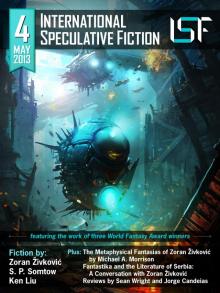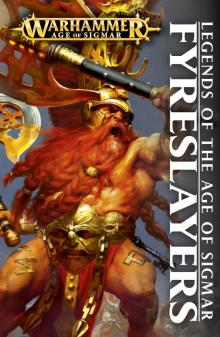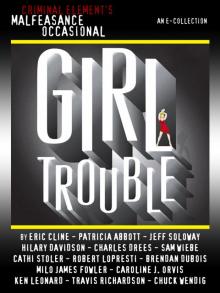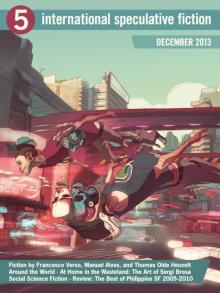- Home
- Various Authors
International Speculative Fiction #4 Page 7
International Speculative Fiction #4 Read online
Page 7
“Tell me a story, grandpa?” Corey said.
“I told you one already,” I said.
“Yeah, you did,” he said wistfully. “About you in the Garden of Eden, and the serpent who was really a kid-eating monster.”
All true. But as the years passed I had come to see that perhaps I was the serpent. I was the one who mixed lies with the truth, and took away his innocence. He was a child, really, a hungry child. And so was I.
“Tell me what happened to him,” Corey said. “Did the people lynch him?”
“No. The court ruled that he was a madman, and sentenced him to a mental home. But the military government of Field Marshall Sarit reversed the decision, and they took him away and shot him. And he didn’t even kill half the kids they said he killed.”
“Like the first girl, the one who was raped and strangled,” Corey said, “but she didn’t get eaten. Maybe that other killer’s still around.” So he had been paying attention after all. I know he loves me, though he rarely says so; he had suffered an old man’s ramblings for one long, air conditioning-free day, without complaint. I’m proud of him, can barely believe I’ve held on to life long enough to get to know him.
I leaned down to kiss him. He clung to me; and, as he let go, he asked me sleepily, “Do you ever feel that hungry, grandpa?”
I didn’t want to answer him; so, without another word, I slipped quietly away.
That night, I wandered in my dreams through fields of the dead; the hunger raged; I killed, I swallowed children whole and spat them out; I burned down cities; I stood aflame in my self-made inferno, howling with elemental grief; and in the morning, without leaving a note, I took a taxi to the airport and flew back to New York.
To face the hunger.
About S. P. Somtow
Once referred to by the International Herald Tribune as “the most well-known expatriate Thai in the world,” Somtow Sucharitkul is no longer an expatriate, since he has returned to Thailand after five decades of wandering the world. He is best known as an award-winning novelist and a composer of operas.
Born in Bangkok, Somtow grew up in Europe and was educated at Eton and Cambridge. His first career was in music and in the 1970s he acquired a reputation as a revolutionary composer, the first to combine Thai and Western instruments in radical new sonorities. Conditions in the arts in the region at the time proved so traumatic for the young composer that he suffered a major burnout, emigrated to the United States, and reinvented himself as a novelist.
His earliest novels were in the science fiction field but he soon began to cross into other genres. In his 1984 novel Vampire Junction, he injected a new literary inventiveness into the horror genre, in the words of Robert Bloch, author of Psycho, “skillfully combining the styles of Stephen King, William Burroughs, and the author of the Revelation to John.” Vampire Junction was voted one of the forty all-time greatest horror books by the Horror Writers’ Association, joining established classics like Frankenstein and Dracula.
In the 1990s Somtow became increasingly identified as a uniquely Asian writer with novels such as the semi-autobiographical Jasmine Nights. He won the World Fantasy Award, the highest accolade given in the world of fantastic literature, for his novella The Bird Catcher. His fifty-three books have sold about two million copies world-wide.
After becoming a Buddhist monk for a period in 2001, Somtow decided to refocus his attention on the country of his birth, founding Bangkok’s first international opera company and returning to music, where he again reinvented himself, this time as a neo-Asian neo-Romantic composer. The Norwegian government commissioned his song cycle Songs Before Dawn for the 100th Anniversary of the Nobel Peace Prize, and he composed at the request of the government of Thailand his Requiem: In Memoriam 9/11 which was dedicated to the victims of the 9/11 tragedy.
According to London’s Opera magazine, “in just five years, Somtow has made Bangkok into the operatic hub of Southeast Asia.” His operas on Thai themes, Madana, Mae Naak, and Ayodhya, have been well received by international critics. His most recent opera, The Silent Prince, was premiered in 2010 in Houston, and a fifth opera, Dan no Ura, will premiere in Thailand in the 2011/2012 season.
He is increasingly in demand as a conductor specializing in opera. His repertoire runs the entire gamut from Monteverdi to Wagner. His work has been especially lauded for its stylistic authenticity and its lyricism. The orchestra he founded in Bangkok, the Siam Philharmonic, is mounting the first complete Mahler cycle in the region.
He is the first recipient of Thailand’s “Distinguished Silpathorn” award, given for an artist who has made and continues to make a major impact on the region’s culture, from Thailand’s Ministry of Culture.
Algorithms for Love
Ken Liu
So long as the nurse is in the room to keep an eye on me, I am allowed to dress myself and get ready for Brad. I slip on an old pair of jeans and a scarlet turtleneck sweater. I’ve lost so much weight that the jeans hang loosely from the bony points of my hips.
“Let’s go spend the weekend in Salem,” Brad says to me as he walks me out of the hospital, an arm protectively wrapped around my waist, “just the two of us.”
I wait in the car while Dr. West speaks with Brad just outside the hospital doors. I can’t hear them but I know what she’s telling him. “Make sure she takes her Oxetine every four hours. Don’t leave her alone for any length of time.”
Brad drives with a light touch on the pedals, the same way he used to when I was pregnant with Aimée. The traffic is smooth and light, and the foliage along the highway is postcard-perfect. The Oxetine relaxes the muscles around my mouth, and in the vanity mirror I see that I have a beatific smile on my face.
“I love you.” He says this quietly, the way he has always done, as if it were the sound of breathing and heartbeat.
I wait a few seconds. I picture myself opening the door and throwing my body onto the highway but of course I don’t do anything. I can’t even surprise myself.
“I love you too.” I look at him when I say this, the way I have always done, as if it were the answer to some question. He looks at me, smiles, and turns his eyes back to the road.
To him this means that the routines are back in place, that he is talking to the same woman he has known all these years, that things are back to normal. We are just another tourist couple from Boston on a mini-break for the weekend: stay at a bed-and-breakfast, visit the museums, recycle old jokes.
It’s an algorithm for love.
I want to scream.
The first doll I designed was called Laura. Clever Laura™.
Laura had brown hair and blue eyes, fully articulated joints, twenty motors, a speech synthesizer in her throat, two video cameras disguised by the buttons on her blouse, temperature and touch sensors, and a microphone behind her nose. None of it was cutting-edge technology, and the software techniques I used were at least two decades old. But I was still proud of my work. She retailed for fifty dollars.
Not Your Average Toy could not keep up with the orders that were rolling in, even three months before Christmas. Brad, the CEO, went on CNN and MSNBC and TTV and the rest of the alphabet soup until the very air was saturated with Laura.
I tagged along on the interviews to give the demos because, as the VP of Marketing explained to me, I looked like a mother (even though I wasn’t one) and (he didn’t say this, but I could listen between the lines) I was blonde and pretty. The fact that I was Laura’s designer was an afterthought.
The first time I did a demo on TV was for a Hong Kong crew. Brad wanted me to get comfortable with being in front of the cameras before bringing me to the domestic morning shows.
We sat to the side while Cindy, the anchorwoman, interviewed the CEO of some company that made “moisture meters.” I hadn’t slept for forty-eight hours. I was so nervous I’d brought six Lauras with me, just in case five of them decided in concert to break down. Then Brad turned to me and whispered, “What do you think moisture
meters are used for?”
I didn’t know Brad that well, having been at Not Your Average Toy for less than a year. I had chatted with him a few times before, but it was all professional. He seemed a very serious, driven sort of guy, the kind you could picture starting his first company while he was still in high school—arbitraging class notes, maybe. I wasn’t sure why he was asking me about moisture meters. Was he trying to see if I was too nervous?
“I don’t know. Maybe for cooking?” I ventured.
“Maybe,” he said. Then he gave me a conspiratorial wink. “But I think the name sounds kind of dirty.”
It was such an unexpected thing, coming from him, that for a moment I almost thought he was serious. Then he smiled, and I laughed out loud. I had a very hard time keeping a straight face while we waited for our turn, and I certainly wasn’t nervous any more.
Brad and the young anchorwoman, Cindy, chatted amiably about Not Your Average Toy’s mission (“Not Average Toys for Not Average Kids”) and how Brad had come up with the idea for Laura. (Brad had nothing to do with the design, of course, since it was all my idea. But his answer was so good it almost convinced me that Laura was really his brainchild.) Then it was time for the dog-and-pony show.
I put Laura on the desk, her face towards the camera. I sat to the side of the desk. “Hello, Laura.”
Laura turned her head to me, the motors so quiet you couldn’t hear their whirr. “Hi! What’s your name?”
“I’m Elena,” I said.
“Nice to meet you,” Laura said. “I’m cold.”
The air conditioning was a bit chilly. I hadn’t even noticed.
Cindy was impressed. “That’s amazing. How much can she say?”
“Laura has a vocabulary of about two thousand English words, with semantic and syntactic encoding for common suffixes and prefixes. Her speech is regulated by a context-free grammar.” The look in Brad’s eye let me know that I was getting too technical. “That means that she’ll invent new sentences and they’ll always be syntactically correct.”
“I like new, shiny, new, bright, new, handsome clothes,” Laura said.
“Though they may not always make sense,” I added.
“Can she learn new words?” Cindy asked.
Laura turned her head the other way, to look at her. “I like learn-ing, please teach me a new word!”
I made a mental note that the speech synthesizer still had bugs that would have to be fixed in the firmware.
Cindy was visibly unnerved by the doll turning to face her on its own and responding to her question.
“Does she”—she searched for the right word—“understand me?”
“No, no.” I laughed. So did Brad. And a moment later Cindy joined us. “Laura’s speech algorithm is augmented with a Markov generator interspersed with—” Brad gave me that look again. “Basically, she just babbles sentences based on keywords in what she hears. And she has a small set of stock phrases that are triggered the same way.”
“Oh, it really seemed like she knew what I was saying. How does she learn new words?”
“It’s very simple. Laura has enough memory to learn hundreds of new words. However, they have to be nouns. You can show her the object while you are trying to teach her what it is. She has some very sophisticated pattern recognition capabilities and can even tell faces apart.”
For the rest of the interview I assured nervous parents that Laura would not require them to read the manual, that Laura would not explode when dropped in water, and no, she would never utter a naughty word, even if their little princesses “accidentally” taught Laura one.
“’Bye,” Cindy said to Laura at the end of the interview, and waved at her.
“’Bye,” Laura said. “You are nice.” She waved back.
Every interview followed the same pattern. The moment when Laura first turned to the interviewer and answered a question there was always some awkwardness and unease. Seeing an inanimate object display intelligent behavior had that effect on people. They probably all thought the doll was possessed. Then I would explain how Laura worked and everyone would be delighted. I memorized the non-technical, warm-and-fuzzy answers to all the questions until I could recite them even without my morning coffee. I got so good at it that I sometimes coasted through entire interviews on autopilot, not even paying attention to the questions and letting the same words I heard over and over again spark off my responses.
The interviews, along with all the other marketing tricks, did their job. We had to outsource manufacturing so quickly that for a while every shantytown along the coast of China must have been turning out Lauras.
The foyer of the bed-and-breakfast we are staying at is predictably filled with brochures from local attractions. Most of them are witch-themed. The lurid pictures and language somehow manage to convey moral outrage and adolescent fascination with the occult at the same time.
David, the innkeeper, wants us to check out Ye Olde Poppet Shoppe, featuring “Dolls Made by Salem’s Official Witch.” Bridget Bishop, one of the twenty executed during the Salem witch trials, was convicted partly based on the hard evidence of “poppets” found in her cellar with pins stuck in them.
Maybe she was just like me, a crazy, grown woman playing with dolls. The very idea of visiting a doll shop makes my stomach turn.
While Brad is asking David about restaurants and possible discounts I go up to our room. I want to be sleeping, or at least pretending to be sleeping, by the time he comes up. Maybe then he will leave me alone and give me a few minutes to think. It’s hard to think with the Oxetine. There’s a wall in my head, a gauzy wall that tries to cushion every thought with contentment.
If only I can remember what went wrong.
For our honeymoon Brad and I went to Europe. We went on the transorbital shuttle, the tickets for which cost more than my yearly rent. But we could afford it. Witty Kimberly™, our latest model, was selling well, and the stock price was transorbital itself.
When we got back from the shuttleport, we were tired but happy. And I still couldn’t quite believe that we were in our own home, thinking of each other as husband and wife. It felt like playing house. We made dinner together, like we used to when we were dating (like always, Brad was wildly ambitious but couldn’t follow a recipe longer than a paragraph and I had to come and rescue his shrimp étouffée). The familiarity of the routine made everything seem more real.
Over dinner Brad told me something interesting. According to a market survey, over 20 percent of the customers for Kimberly were not buying it for their kids at all. They played with the dolls themselves.
“Many of them are engineers and comp sci students,” Brad said. “And there are already tons of net sites devoted to hacking efforts on Kimberly. My favorite one had step-by-step instructions on how to teach Kimberly to make up and tell lawyer jokes. I can’t wait to see the faces of the guys in the legal department when they get to drafting the cease-and-desist letter for that one.”
I could understand the interest in Kimberly. When I was struggling with my problem sets at MIT, I would have loved to take apart something like Kimberly to figure out how she worked. How it worked, I corrected myself mentally. Kimberly’s illusion of intelligence was so real that sometimes even I unconsciously gave her, it, too much credit.
“Actually, maybe we shouldn’t try to shut the hacking efforts down,” I said. “Maybe we can capitalize on it. We can release some of the APIs and sell a developer’s kit for the geeks.”
“What do you mean?”
“Well, Kimberly is a toy, but that doesn’t mean only little girls would be interested in her.” I gave up trying to manage the pronouns. “She does, after all, have the most sophisticated, working, natural conversation library in the world.”
“A library that you wrote,” Brad said. Well, maybe I was a little vain about it. But I’d worked damned hard on that library and I was proud of it.
“It would be a shame if the language processing module never got any
application besides sitting in a doll that everyone is going to forget in a year. We can release the interface to the modules at least, a programming guide, and maybe even some of the source code. Let’s see what happens and make an extra dollar while we’re at it.” I never got into academic AI research because I couldn’t take the tedium, but I did have greater ambitions than just making talking dolls. I wanted to see smart and talking machines doing something real, like teaching kids to read or helping the elderly with chores.
I knew that he would agree with me in the end. Despite his serious exterior he was willing to take risks and defy expectations. It was why I loved him.
I got up to clear the dishes. His hand reached across the table and grabbed mine. “Those can wait,” he said. He walked around the table, pulling me to him. I looked into his eyes. I loved the fact that I knew him so well I could tell what he was going to say before he said it. Let’s make a baby, I imagined him saying. Those would have been the only words right for that moment.
And so he did.
I’m not asleep when Brad finishes asking about restaurants and comes upstairs. In my drugged state, even pretending is too difficult.
Brad wants to go to the pirate museum. I tell him that I don’t want to see anything violent. He agrees immediately. That’s what he wants to hear from his content, recovering wife.
So now we wander around the galleries of the Peabody Essex Museum, looking at the old treasures of the Orient from Salem’s glory days.
The collection of china is terrible. The workmanship in the bowls and saucers is inexcusable. The patterns look like they were traced on by children. According to the placards, these were what the Cantonese merchants exported for foreign consumption. They would never have sold such stuff in China itself.

 Lady Ambleforth's Afternoon Adventure by Ann Lethbridge, Barbara Monajem, Annie Burrows, Elaine Golden, Julia Justiss and Louise Allen
Lady Ambleforth's Afternoon Adventure by Ann Lethbridge, Barbara Monajem, Annie Burrows, Elaine Golden, Julia Justiss and Louise Allen Gods & Mortals
Gods & Mortals St. Somewhere Journal, July 2013
St. Somewhere Journal, July 2013 firstwriter.com First Short Story Anthology
firstwriter.com First Short Story Anthology Warcry: The Anthology
Warcry: The Anthology Sacrosanct & Other Stories
Sacrosanct & Other Stories Ultimate Heroes Collection
Ultimate Heroes Collection Cthulhu Deep Down Under Volume 2
Cthulhu Deep Down Under Volume 2 Erotic Classics II
Erotic Classics II Dynasties: The Elliotts, Books 1-6
Dynasties: The Elliotts, Books 1-6 Dynasties:The Elliots, Books 7-12
Dynasties:The Elliots, Books 7-12 International Speculative Fiction #4
International Speculative Fiction #4 Fyreslayers
Fyreslayers One Night In Collection
One Night In Collection Mortal Crimes 2
Mortal Crimes 2 Some of the Best from Tor.com
Some of the Best from Tor.com Howl & Growl: A Paranormal Romance Boxed Set
Howl & Growl: A Paranormal Romance Boxed Set The Conan Compendium
The Conan Compendium The Malfeasance Occasional
The Malfeasance Occasional Brides of Penhally Bay - Vol 4
Brides of Penhally Bay - Vol 4 Brides of Penhally Bay - Vol 2
Brides of Penhally Bay - Vol 2 Brides of Penhally Bay - Vol 1
Brides of Penhally Bay - Vol 1 School's in Session
School's in Session International Speculative Fiction #5
International Speculative Fiction #5 Erotic Classics I
Erotic Classics I Legends: Stories in Honor of David Gemmell
Legends: Stories in Honor of David Gemmell Mortal Crimes 1
Mortal Crimes 1 The Classic Children's Literature Collection: 39 Classic Novels
The Classic Children's Literature Collection: 39 Classic Novels Don't Read in the Closet volume one
Don't Read in the Closet volume one Some of the Best from Tor.com: 2014: A Tor.Com Original
Some of the Best from Tor.com: 2014: A Tor.Com Original The Fitzwarren Inheritance
The Fitzwarren Inheritance All Things Zombie: Chronology of the Apocalypse
All Things Zombie: Chronology of the Apocalypse Hammer and Bolter - Issue 12
Hammer and Bolter - Issue 12 Kiss Kiss
Kiss Kiss Dog Stories
Dog Stories Bad Blood Collection
Bad Blood Collection